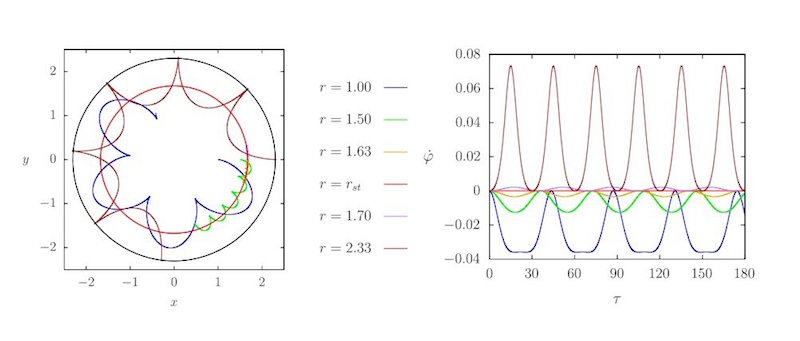 When a particle with a certain angular momentum is located at the critical distance rst, it remains at rest while the spacetime is rotating around it. The closer a particle is to this critical distance, the slower it moves. Credit: Collodel et al. ©2018 American Physical Society
When a particle with a certain angular momentum is located at the critical distance rst, it remains at rest while the spacetime is rotating around it. The closer a particle is to this critical distance, the slower it moves. Credit: Collodel et al. ©2018 American Physical Society
May 25, 2018 (Phys.org) -- When a massive astrophysical object, such as a boson star or black hole, rotates, it can cause the surrounding spacetime to rotate along with it due to the effect of frame dragging. In a new paper, physicists have shown that a particle with just the right properties may stand perfectly still in a rotating spacetime if it occupies a "static orbit" -- a ring of points located a critical distance from the center of the rotating spacetime.
The physicists, Lucas G. Collodel, Burkhard Kleihaus, and Jutta Kunz, at the University of Oldenburg in Germany, have published a paper in which they propose the existence of static orbits in rotating spacetimes in a recent issue of Physical Review Letters.
"Our work presents with extreme simplicity a long-ignored feature of certain spacetimes that is quite counterintuitive," Collodel told Phys.org. "General relativity has been around for a bit more than a hundred years now and it never ceases to amaze, and exploring the ways that different distributions of energy can warp the geometry of spacetime in a non-trivial way is key to a deeper understanding."
In their paper, the physicists identify two criteria for a particle to remain at rest with respect to a static observer in a rotating spacetime. First, the particle's angular momentum (basically its own rotation) must have just the right value so that it perfectly cancels out the rotation due to frame dragging. Second, the particle must be located precisely in the static orbit, a ring around the center of the rotating spacetime at which the particle is neither pulled toward the center nor pushed away.
(more)
READ MORE: Phys.org






